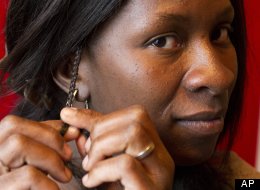Jestina Clayton Wins Battle Against Utah Over Hair Braiding
Share
Explore Our Galleries
Breaking News!
Today's news and culture by Black and other reporters in the Black and mainstream media.
Ways to Support ABHM?
From the Associated Press

A Utah woman who braids hair to supplement her family’s income has won a federal lawsuit against the state over its licensing process for her craft, arguing state regulations violated her right to earn a living.
A federal judge ruled this week that the state’s requirement that Jestina Clayton get a cosmetology license to braid hair was “unconstitutional and invalid” because regulations are irrelevant to Clayton’s profession.
Clayton, 30, sued last year after she found it would be illegal to run a hair-braiding business without a license, in part because of public health and safety concerns. Clayton said she learned how to braid hair as a 5-year-old in her West African home country of Sierra Leone, and she was doing it at her suburban Salt Lake City home to support her three children – ages 7, 5 and 1 – while her husband finishes school.
U.S District Judge David Sam in Salt Lake City said Utah’s cosmetology licensing requirements are so disconnected from hair-braiding “that to premise Jestina’s right to earn a living by braiding hair on that scheme is wholly irrational and a violation of her constitutionally protected rights.”
Read more of the story here.









Comments Are Welcome
Note: We moderate submissions in order to create a space for meaningful dialogue, a space where museum visitors – adults and youth –– can exchange informed, thoughtful, and relevant comments that add value to our exhibits.
Racial slurs, personal attacks, obscenity, profanity, and SHOUTING do not meet the above standard. Such comments are posted in the exhibit Hateful Speech. Commercial promotions, impersonations, and incoherent comments likewise fail to meet our goals, so will not be posted. Submissions longer than 120 words will be shortened.
See our full Comments Policy here.